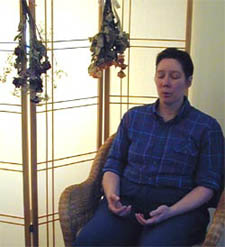|
|
 Guided Imagery |
It has been theorized that if stress contributes to illness, then stress reduction should promote health. This, in fact, has been studied. Herbert Benson, MD, has performed such studies. He uses a technique he calls the relaxation response. This is basically a distillation of the basic meditation practices used in many cultures. The relaxation response has been shown to decrease heart rate, blood pressure, enhance health and reduce the incidence of illness. Another tenant of mind-body medicine is taking self-responsibility for healing. By becoming actively involved in self-healing one shifts from the feeling of helplessness and hopelessness, emotions that have been linked to increased illness and death, to a sense of hopefulness and control, emotions that have been linked to wellness. The next basic tenant is the body's innate healing capacity. The placebo effect is a well-known phenomenon in Western medicine. It is well documented that as much as 30% of any medications affect is due to placebo. Placebo is thought to be the mind's healing effect on the body. The practice of mind-body medicine can take many forms. It can range from the more common support group type of environment, such as the one described in the introductory sections on mind-body interactions regarding the studies of women with breast cancer, to more formal meditative practices, such as those taught by Dr. Benson at Harvard or Dr. John Kabat-Zinn and written about in his book Full Catastrophe Living. It can also take the form of various prayer rituals. Dr. Delores Krieger, PhD, RN, is a practitioner of a technique known as therapeutic touch. She believes that therapeutic touch…"is a contemporary interpretation of several ancient healing practices in which the practitioner consciously directs or sensitively modulates human energy." According to research done, therapeutic touch can increase hemoglobin, decrease anxiety, reduce pain, accelerate the healing of surgical wounds and help correct dysfunctions of the autonomic nervous system. A widely publicized article in the Journal of the American Medical Association disputed its validity; however, a close look at that study will show there was not an outcomes-based study but rather, a study of the purported mechanism only. At this point, the mechanism of any and all of these mind-body interactions is not known. What is known is that outcome efficacy studies have been shown to be beneficial. |
|
For questions, please contact Terry Estep |
|
The
University of Minnesota Duluth is an equal opportunity educator and
employer. |